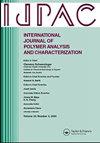Effect of thermal ageing on electrical, mechanical properties of glass fiber reinforced polymer and its impact on service life
IF 1.7
4区 工程技术
Q4 POLYMER SCIENCE
International Journal of Polymer Analysis and Characterization
Pub Date : 2023-01-01
DOI:10.1080/1023666X.2023.2240099
引用次数: 0
Abstract
The mechanical and electrical properties of polymer composites often degrade due to environmental factors and shorten their service life. This article presents the effect of high temperatures on the mechanical and electrical characteristics of glass fiber reinforced composites and from the measurements, an attempt is made to predict the service life. Electrical conductivity, impedance and resistance are studied with a short-term temperature effect at 30, 60, 120, and 180 °C. The effect of temperature exposure at 120 and 160 °C for 1000, 2000, and 3000 h has been investigated to assess the changes in flexural, compressive, and tensile properties and for prediction of service life. Morphological studies are carried out to support some of the experimental results. The mechanical properties of composites are observed to deteriorate with the duration of aging. Flexural, tensile, and compressive strengths reveal a reduction of 8, 10, and 9%, after aging at 3000 h at 160 °C. The tensile strength and tensile modulus at 120 °C aged for 3000 h exhibit minimal changes as compared to unaged composites. However, with an increase in temperature to 160 °C, there is a reduction in tensile strength and modulus of composites by less than 10%, and 6% compared to composites with nanofillers. The variations in compression strength at 120 and 160 °C is not significant. Based on the reduction of tensile strength with temperature, the service life of composites has been estimated. For a predicted service life of 20 years, composites with nanofillers would be able to retain tensile strength of 90% of tensile strength.
热老化对玻璃纤维增强聚合物电学、力学性能的影响及其对使用寿命的影响
摘要高分子复合材料的力学性能和电学性能经常受到环境因素的影响而降低,缩短了其使用寿命。本文介绍了高温对玻璃纤维增强复合材料力学和电学特性的影响,并通过测量对其使用寿命进行了预测。电导率、阻抗和电阻在30,60,120和180°C的短期温度效应下进行了研究。研究了在120和160℃下暴露1000、2000和3000小时的影响,以评估弯曲、压缩和拉伸性能的变化,并预测使用寿命。形态学研究支持了一些实验结果。复合材料的力学性能随时效时间的延长而恶化。在160°C、3000 h时效后,其弯曲、拉伸和抗压强度分别降低了8%、10%和9%。与未老化的复合材料相比,在120°C时效3000 h时的拉伸强度和拉伸模量变化最小。然而,当温度升高到160°C时,复合材料的抗拉强度和模量的下降幅度小于10%,与纳米填料的复合材料相比,下降幅度小于6%。在120和160℃时的抗压强度变化不显著。根据抗拉强度随温度的降低,估算了复合材料的使用寿命。在预计使用寿命为20年的情况下,含有纳米填料的复合材料将能够保持90%的抗拉强度。
本文章由计算机程序翻译,如有差异,请以英文原文为准。
求助全文
约1分钟内获得全文
求助全文
来源期刊
CiteScore
3.50
自引率
5.30%
发文量
37
审稿时长
1.6 months
期刊介绍:
The scope of the journal is to publish original contributions and reviews on studies, methodologies, instrumentation, and applications involving the analysis and characterization of polymers and polymeric-based materials, including synthetic polymers, blends, composites, fibers, coatings, supramolecular structures, polysaccharides, and biopolymers. The Journal will accept papers and review articles on the following topics and research areas involving fundamental and applied studies of polymer analysis and characterization:
Characterization and analysis of new and existing polymers and polymeric-based materials.
Design and evaluation of analytical instrumentation and physical testing equipment.
Determination of molecular weight, size, conformation, branching, cross-linking, chemical structure, and sequence distribution.
Using separation, spectroscopic, and scattering techniques.
Surface characterization of polymeric materials.
Measurement of solution and bulk properties and behavior of polymers.
Studies involving structure-property-processing relationships, and polymer aging.
Analysis of oligomeric materials.
Analysis of polymer additives and decomposition products.

 求助内容:
求助内容: 应助结果提醒方式:
应助结果提醒方式:


